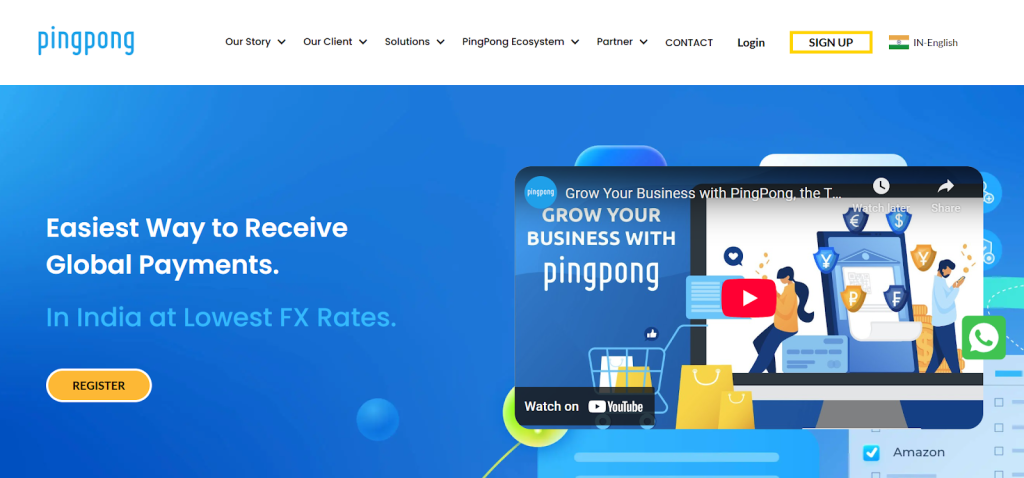For Amazon Sellers: PingPong vs Payoneer — Which Is the Smarter Choice?

Selling on Amazon has opened up immense opportunities for entrepreneurs around the world. However, managing international payments efficiently is one of the critical challenges that Amazon sellers face. Choosing the right payment platform can directly affect your cash flow, operational efficiency, and profitability. Two popular options in this space are PingPong and Payoneer. Let’s dive deep into a comparison to help you decide which is the smarter choice for your business.
Why International Payments Matter for Amazon Sellers
As an Amazon seller, you often deal with multiple marketplaces—U.S., Europe, Japan, and beyond. This means you need a payment solution that can handle multi-currency transactions, offer competitive exchange rates, and ensure your funds are transferred safely and quickly. Delays or high fees can eat into your profit margins and slow down your ability to reinvest in inventory.
Overview: PingPong and Payoneer
PingPong is a rapidly growing financial services provider designed specifically for e-commerce sellers. It helps businesses collect payments from global marketplaces and transfer funds to their local bank accounts efficiently. You can view here to learn more about PingPong’s services.
Payoneer, on the other hand, has been a well-established player in cross-border payments for years. Many Amazon sellers are familiar with Payoneer due to its broad marketplace integrations and global reach.
While both platforms solve the problem of international payments, the differences lie in cost, convenience, and seller-specific features.
1. Fees and Exchange Rates
- For Amazon sellers, minimizing fees can make a significant difference over time.
- PingPong offers competitive exchange rates and lower withdrawal fees compared to Payoneer. Sellers often report cost savings, especially when transferring large sums from international marketplaces to their local bank accounts.
- Payoneer charges higher currency conversion fees and additional charges for certain transfers, which can accumulate over time.
- When it comes to keeping more of your earnings, PingPong has a clear advantage.
2. Ease of Use and Integration
- Time is money, and a platform that integrates seamlessly with Amazon is invaluable.
- PingPong is designed for e-commerce sellers and offers direct integration with Amazon marketplaces, making it easier to reconcile payments and track transactions. Its interface is user-friendly, and opening an account is straightforward. You can view here for an in-depth look at the platform.
- Payoneer also supports Amazon, but its setup and navigation can be slightly more complex, especially for first-time users
- For sellers who value simplicity and efficiency, PingPong tends to win.
3. Payout Speed
- Quick access to funds is critical for reinvesting in inventory and scaling your business.
- PingPong offers fast payouts, often faster than Payoneer, especially for withdrawals to local bank accounts.
- Payoneer can experience delays depending on the country and bank, which may slow down your cash flow.
4. Customer Support
- Responsive customer service can save you headaches when issues arise.
- PingPong has a dedicated team familiar with Amazon seller needs and provides support in multiple languages.
- Payoneer has broad support but sometimes lacks the personalized approach for sellers who rely heavily on Amazon operations.

5. Seller-Specific Tools
PingPong offers tools specifically designed for Amazon sellers, including:
- Automatic currency conversion
- Multi-country payout management
- Transaction tracking tailored for e-commerce
- Payoneer provides general global payment solutions but doesn’t always focus on Amazon-centric features.
Verdict: Which is the Smarter Choice?
For Amazon sellers prioritizing cost efficiency, fast payouts, ease of use, and seller-specific features, PingPong often comes out ahead. That said, Payoneer remains a solid choice for sellers who already have established accounts and are comfortable with its fee structure.
If you’re exploring a more Amazon-friendly payment solution, it’s worth checking out PingPong directly. You can view here for full details on how PingPong can simplify your international payments and help you focus on growing your business rather than worrying about fund transfers.
Conclusion
Selecting the right payment platform is more than just a financial decision—it impacts your ability to operate efficiently across global marketplaces. PingPong’s e-commerce-focused approach makes it an attractive alternative to Payoneer, especially for Amazon sellers looking to optimize fees, speed, and convenience. For more information on simplifying your international payments, you can explore PingPong here.



